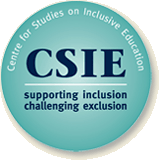
supporting inclusion, challenging exclusion
legislation and guidance for inclusive education
Inclusive education and the law in the UK
The law supporting inclusive education in the UK
Legislation in the UK prohibits discrimination in education and supports inclusive education. The UK also has obligations under international human rights law to provide inclusive education for all children.
Education without discrimination in UK law
It is unlawful for any education provider, including a private or independent provider, to discriminate between pupils on grounds of race, sex, disability, sexual orientation, gender reassignment, pregnancy and maternity, and religion or belief in admissions, access to benefits or services, exclusions, and in the employment of staff. There are some exceptions age so as to allow for the maintenance of faith schools and single-sex schools; some disabled pupils and pupils with a statement of “special educational needs” may be segregated in special schools, and schools may temporarily or permanently exclude pupils for disciplinary reasons.
Until October 2010, legal prohibitions of discrimination were found in a number of different laws enacted over many years. On 1 October 2010, the Equality Act came into force, consolidating and strengthening the various equality laws. However, the change from a Labour government to a LibDem/Conservative coalition government between the passage of the Act and its coming into force has delayed preparation for full implementation of the Act and resulted in some elements being targeted for revision or even non-implementation. Consultations are still under way on other aspects of the new law.
Further information on the Equality Act 2010 in relation to schools is available here.
Information on antidiscrimination law prior to October 2010 is provided below:
- Education without disability discrimination
- Education without sex discrimination
- Education without racial discrimination
The UK’s obligations under international human rights law
The UK has ratified the following international human rights treaties which place the Government under an obligation to provide education free from discrimination:
- UN Convention on the Rights of the Child (ratified by the UK in 1991)
- UN Convention on the Elimination of All Forms of Discrimination against Women (ratified in 1986)
- International Covenant on Economic, Social and Cultural Rights (ratified in 1976)
- International Convention on the Elimination of All Forms of Racial Discrimination (ratified in 1969)
- UNESCO Convention against discrimination in education
In March 2007, the UK signed the UN Convention on the Rights of Persons with Disabilities, but as at March 2008 had not ratified it.
Regional human rights instruments also confirm the right to education free from discrimination. These include the European Social Charter and Revised Social Charter and the First Protocol to the European Convention on Human Rights. The UK ratified the European Social Charter in 1962, but as at July 2008 had not ratified the Revised Charter. The European Convention on Human Rights was incorporated into UK law in the Human Rights Act 1998.
For more information, please see our inclusive education and international human rights instruments and the European human rights pages.
Note: some of the documents on this page are in PDF format. In order to view a PDF you will need Adobe Acrobat Reader
Page last updated: Tuesday 26 March 2024